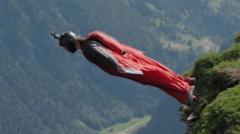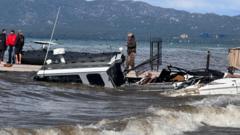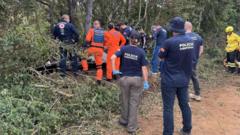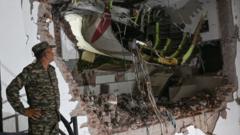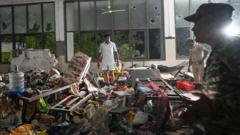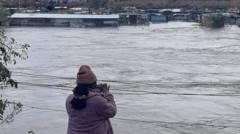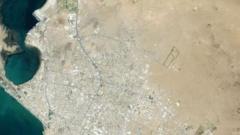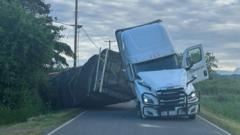Survivors of the Sea Story, a dive boat that sank in the Red Sea, share their terrifying 35-hour ordeal trapped in an air pocket, casting doubt on the official cause of the sinking and highlighting safety failings by the operating company.
Survivors of Red Sea Boat Tragedy Share Harrowing Account of their 35-Hour Ordeal
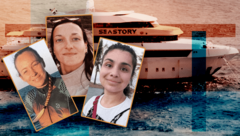
Survivors of Red Sea Boat Tragedy Share Harrowing Account of their 35-Hour Ordeal
As rescuers continue to piece together the causes of the Sea Story's tragic sinking, survivors recount their horrifying experiences trapped for over a day in darkness and uncertainty.
The Sea Story, a luxury dive boat, sunk in the Red Sea on November 25, leaving 35 survivors who were eventually rescued after an alarming 35 hours trapped in darkness. Lucianna Galetta was the last to be saved, her voice heavy with emotion as she recalled her near-fatal experience. With the vessel flipped on its side, she and her partner, Christophe Lemmens, along with dive instructor Youssef al-Faramawy, found themselves in a precarious air pocket in the engine room, cut off from the outside world. Lucianna's anguish grew as darkness crept in, raising despair over their rescue.
Initially embarking from Port Ghaleb with 31 international guests and 12 Egyptian crew members, those on board soon learned that this trip wouldn't go as planned. The joy of diving quickly became overshadowed by chaotic scenes on deck that foreshadowed tragedy. Eyewitness accounts point fingers at a combination of human error and design flaws in the boat, contradicting claims from Egyptian authorities that a massive wave was the cause of the sinking.
As conditions worsened through the night, survivors described frantic efforts to escape their cabins, navigating the overturned vessel plagued by scattered belongings and panic. Sarah Martin, another survivor, highlighted the delays in alarm systems as rescuers struggled to locate the capsized boat. “We didn't think anyone was coming," she recounted.
Critics, including renowned oceanographer Dr. Simon Boxall, argue that a wave of such magnitude could not have been present on that day, suggesting deeper issues at play. With at least 11 people confirmed dead or missing, questions linger about safety protocols and the responsibility of Dive Pro Liveaboard, which has previously faced scrutiny for similar incidents.
By the time rescuers arrived 27 hours late, the survivors were overcome with a mix of relief and anger, with many uncertain of their own futures. Lucianna's quest for answers persists as she seeks closure for those who were not as fortunate. "We are lucky to be alive," she stated, reflecting on the grave losses and the urgency of continued investigation into the disaster.
As survivors grapple with their trauma, the broader narrative serves as a stark reminder of the potential hazards in marine tourism and the importance of stringent safety regulations.
Initially embarking from Port Ghaleb with 31 international guests and 12 Egyptian crew members, those on board soon learned that this trip wouldn't go as planned. The joy of diving quickly became overshadowed by chaotic scenes on deck that foreshadowed tragedy. Eyewitness accounts point fingers at a combination of human error and design flaws in the boat, contradicting claims from Egyptian authorities that a massive wave was the cause of the sinking.
As conditions worsened through the night, survivors described frantic efforts to escape their cabins, navigating the overturned vessel plagued by scattered belongings and panic. Sarah Martin, another survivor, highlighted the delays in alarm systems as rescuers struggled to locate the capsized boat. “We didn't think anyone was coming," she recounted.
Critics, including renowned oceanographer Dr. Simon Boxall, argue that a wave of such magnitude could not have been present on that day, suggesting deeper issues at play. With at least 11 people confirmed dead or missing, questions linger about safety protocols and the responsibility of Dive Pro Liveaboard, which has previously faced scrutiny for similar incidents.
By the time rescuers arrived 27 hours late, the survivors were overcome with a mix of relief and anger, with many uncertain of their own futures. Lucianna's quest for answers persists as she seeks closure for those who were not as fortunate. "We are lucky to be alive," she stated, reflecting on the grave losses and the urgency of continued investigation into the disaster.
As survivors grapple with their trauma, the broader narrative serves as a stark reminder of the potential hazards in marine tourism and the importance of stringent safety regulations.





